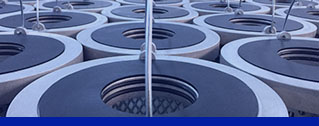
Filters are a small however important a part of hydraulic machinery, though serving no mechanical purpose they are integral to the proper functioning of the machine and to prolonging the active lifetime of the tools and the hydraulic fluid which drives it. The function of a filter is to take away and/or include particles of contamination and preserve the fluid that flows round the machine clear. Any contamination in the oil can cause damage to transferring elements further downstream, and this will lead to seizing up of transferring elements, corrosion of other components and dear replacements. Once we think about the implications of not using a filter, the significance of those little items turns into extra important.
Â
There are two main kinds of hydraulic oil filter – surface and depth filters. The floor filter, as the title suggests, removes contamination from the surface of the oil and could also be useful in functions where gravity feeds the oil via an area suitable for such a filter throughout operation. A depth filter may be submerged in a reservoir or chamber and can remove particles from the whole lot of the body of fluid. Depth filters due to this fact, are more effective and can retain a bigger amount of contamination and unwanted particles earlier than they need to be cleaned or replaced.
Â
The supplies used to make hydraulic filters varies, as does the cost accordingly. Glass filters are costlier however they are more environment friendly, especially when glass fibres are utilized in a depth filter. Glass can be non-reactive, meaning it can be used with any kind of hydraulic fluid. Steel filters are also fairly environment friendly, however they can't be used with all forms of hydraulic fluid, as a result of incompatibilities between certain hydraulic oils and a few metals. The place it's acceptable to make use of a metal filter there is the option of a magnetic filter system, which works as a depth filter and uses a magnetic charge to attract metal particles that may have entered the fluid system. If the hydraulic gear is used in metallic working and fabrication then the prospect of potential contamination being from metallic particles is high; magnetic filters will cope with this contamination while another sort of filter can be used to cope with other forms of pollution.
Â
Cellulose or paper can be used to make a hydraulic fluid filter, but these have a short life expectancy and need frequent substitute. They're cheaper than the opposite varieties, but could find yourself costing more in the long run, on account of regular downtime for replacement and the potential harm to equipment if they don't seem to be replaced usually sufficient.
Â
It may seem like glass is your best option; regardless of costing a bit more it does the most effective job and will not want replacing too often. The downside of a glass filter is actually its energy as nicely; the superior filtering skill can actually lead to a drop in stress, in the system, which is often undesirable. It is very vital, therefore, to test how a drop in hydraulic system strain will affect productiveness and efficiency in case you are contemplating switching to glass filters from another materials type. Take into account also whether or not this drop in pressure is prone to result in unnecessary changes of stress aid valves, resulting in potentially dangerous construct ups of stress elsewhere.
Â
The options of hydraulic oil filters do not finish after materials type and development, as there may be nonetheless the issue of scores and specs to contend with. All filters have an ISO 4406 score, and the decrease the code of any given filter, the higher it's at eradicating contamination. Hydraulic filters might also have a beta ratio, which is the ratio of particles discovered upstream of the filter divided by the number found downstream. For beta ratios, the higher it is the better, and this can be used to present a share for effectiveness.
Â
It is also important to examine that the stream charge of the filter is compatible with the move rate of the machinery it's for use in; too fast and the filter will not be able to successfully take away contamination, too slow and it could grow to be clogged rapidly. The operational pressure of the hydraulic system can be vital, because the filter should have the ability to face up to that drive for a protracted amount of time. The final factor to verify is that the filter might be linked to the gear, Additional info so examine the port size of the filter and guarantee it is compatible with the equipment within the location it is to be fitted.
Â
There's a lot to think about here, however selecting the most appropriate hydraulic fluid filter is an train that it is price spending some time on, as it may well make a giant difference to the efficiency and lifespan of your hydraulic equipment and save on downtime and substitute costs in the long term.